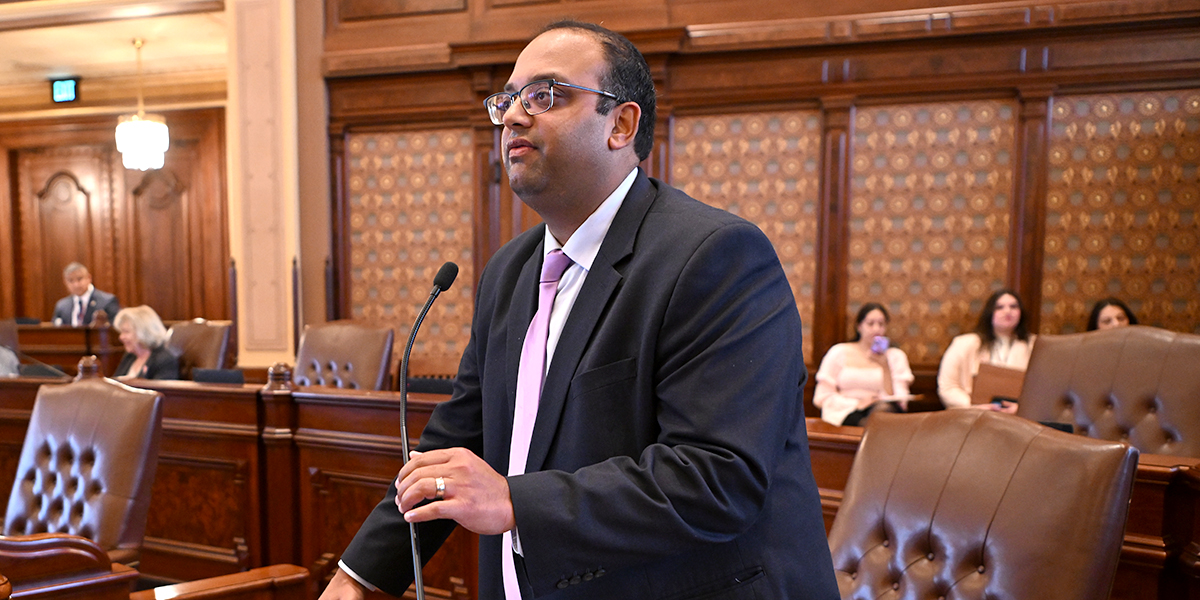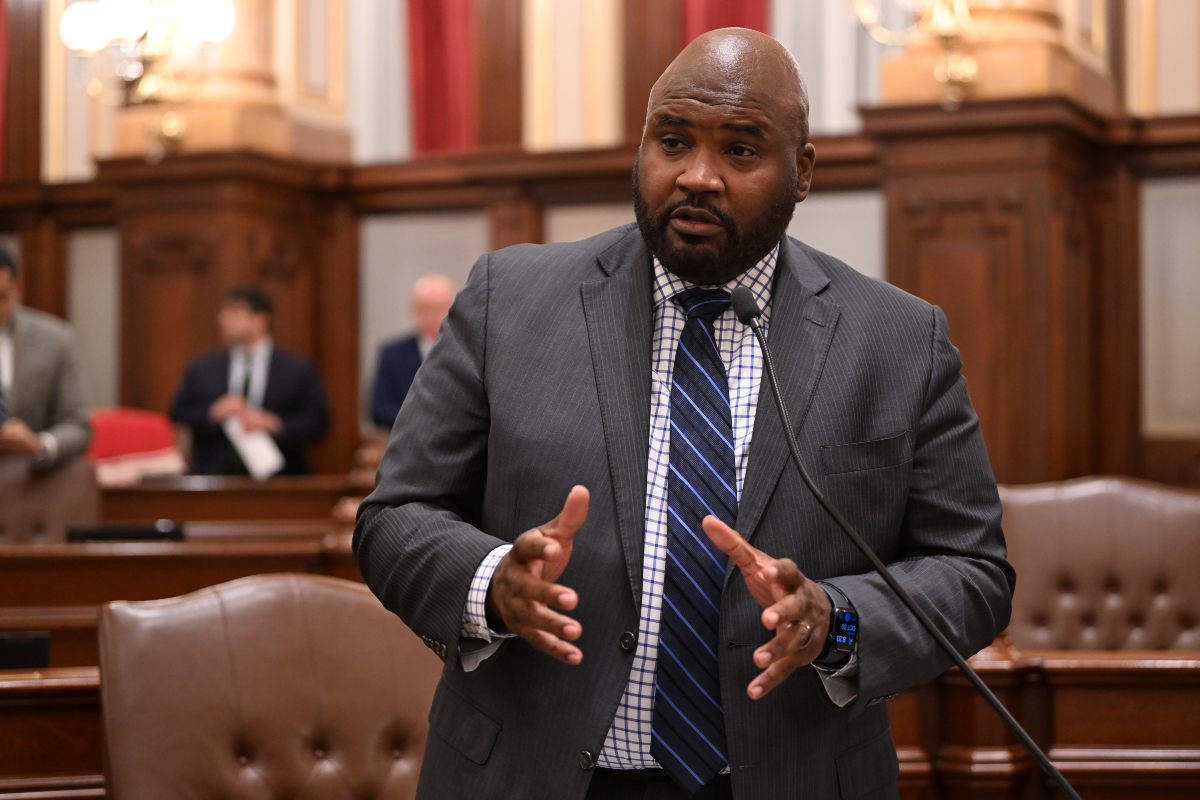- Details
Senate Democrats pass landmark legislation to enhance civil rights amid ICE activities
SPRINGFIELD — Senate President Don Harmon advanced legislation out of the Senate responding to infringements on personal liberty by federal immigration agents in Illinois.
“Masks might conceal their faces, but they can’t hide the constitutional abuses we’ve seen daily,” said Harmon (D-Oak Park). “This gives the growing number of victims a clear, legal path to go after the abusers and hold them accountable.”
Villivalam: Delivering a world-class public transit system that Illinoisans deserve
SPRINGFIELD — State Senator Ram Villivalam passed historic legislation through the Senate providing necessary reforms and transformational investments to address the public transit fiscal cliff in Illinois.
“Our public transit systems are the backbone of our communities – connecting residents to their jobs, schools, doctors and more,” said Villivalam (D-Chicago). “Now is the time to embrace viable, long-term solutions that provide a world-class public transit system to Illinoisans.”
Sims leads legislation to protect state budget from reckless federal cuts
SPRINGFIELD — In response to devastating cuts to essential programs by the federal administration, State Senator Elgie R. Sims, Jr. led a measure to decouple Illinois tax policy from harmful federal changes and protect the state's Fiscal Year 2026 budget.
"While the federal administration carelessly slashes funding for programs that Illinois families depend on, we refuse to let their recklessness blow a hole in our state budget," said Sims (D-Chicago). "This measure is about protecting Illinois taxpayers and ensuring we can continue funding schools, health care and vital services despite the chaos coming from the federal government."

In case you missed it
MEMBERS IN THE NEWS
Senator Linda Holmes, Aurora: ‘Right to die’ bill passed by Illinois lawmakers, awaits Pritzker’s signature | FOX 32
Senator Steve Stadelman, Rockford: Lawmakers OK sweeping energy reform package that governor pledges to sign | Capitol News Illinois
Senator Rachel Ventura, Joliet: State senate OKs bill to transfer Joliet prison land to Will County forest preserve district | Shaw Local
Copyright 2025 - Illinois Senate Democratic Caucus - All Rights Reserved
- Details
SPRINGFIELD -- Senate President Don Harmon, an Oak Park Democrat, issued the following statement following the Senate’s approval of a balanced state budget Saturday.
“Despite the economic uncertainty emanating from Washington, we approved a budget that invests hundreds of millions of new dollars in public education, protects access to critical hospitals and health care facilities and does it all without raising state income or sales taxes.
“We all wish we could do more. But this is a responsible, balanced budget that continues our work to improve the lives of the great people of the great state of Illinois. I want to thank the members of the Senate Democratic Caucus, the House Democratic Caucus, Speaker Welch and Governor Pritzker for the united effort to achieve our shared goals.”

- Details
On February 1, Senate President Harmon spoke to a broad partnership of government, business, civic, religious and neighborhood groups about putting resources to work in designated communities to save lives and end violence.
The event marked two years of double-digit declines in shootings in Chicago.
Video of the event and the full text of Harmon's remarks as prepared are below.
Good morning, all.
Thank you for the invitation to come here today and learn about the amazing strides you’re making to eradicate gun violence in our communities.
It is inspiring to see a group of such dedicated volunteers and advocates.
Our fight to end community gun violence has no easy answers and no quick solutions.
It can feel thankless at times.
Much attention is given to mass shootings, especially when they touch communities less familiar with gun violence, but Chicago deals with mass shootings every week – just not on the same sidewalk or street corner.
The carnage is just as devastating.
Thanks to the work of organizations like yours, though, it is lessening bit by bit.
We’re here today to recognize two years in a row of double-digit declines in shootings.
That number looks good on paper, but it’s more than just that. It’s dozens of parents, siblings and friends who still have someone in their lives who otherwise might have been taken from them by gun violence.
Progress like this is only possible when we work together and take a holistic approach to solving the problem.
Community groups, religious leaders, lawmakers and business owners must all collaborate, because gun violence impacts every corner of this city and state.
The Senate Democrats remain committed to supporting programs to reduce violence and improve outcomes, not only, for youth, but for all Illinois residents.
That’s what spurred the General Assembly to pass the Reimagine Public Safety Act several years ago.
We wanted to direct funding and resources to community members, because community members a know best what underlying concerns fuel the violence epidemic.
We will continue to prioritize and fight for resources at the state level.
But we also know that it takes more than resources from Springfield to solve this problem.
And that is what makes this effort, this group so special – the dedication from civic groups to go neighborhood by neighborhood to reclaim communities.
Together we will make a difference.
Together we will make things better.
In closing, I want to offer my sincerest thanks to all of you for your bravery, dedication and selflessness.
It can be hard to see in the midst of the daily struggle, but we are making progress.
It took 16 years and multiple failures to pass legislation requiring gun dealer registration.
Building on that success, a recent law banning the manufacture and sale of assault weapons had a much easier path to the governor’s desk.
We are headed in the right direction.
For that, I thank you. Keep up the good work.
- Details
SPRINGFIELD -- The Illinois Senate approved an expanded vote-by-mail program that has garnered increased popularity across the state and country amid public health concerns over voting and elections during the COVID-19 outbreak.

Senate President Don Harmon voted for the expanded vote-by-mail program and issued the following statement:
“This is an overdue step toward modern convenience and safety in our elections,” said Harmon. “It’s unfortunate it took a global pandemic to convince people of its value, but expanding vote by mail is a needed election reform that I hope voters will utilize.”
Under the proposal:
- Any person who has voted in the past two years (2018 General Election, 2019 Consolidated Election or 2020 Primary Election) would receive an application for a ballot in their mailbox.
- Any person who registered to vote after the 2020 Primary Election would also receive an application.
- General Election Day, November 3, 2020, would be a state holiday.
This does not preclude in-person voting opportunities on and/or before Election Day.
The legislation is SB1863.
After the Senate’s 37-19 vote, the legislation’s next destination is the governor’s desk.
More Articles …
Page 1 of 3








